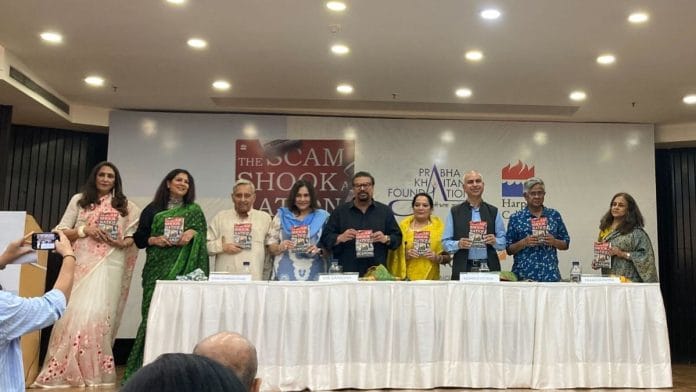New Delhi: Any scandal in India is followed by public outrage. Then there are “allegations, counter-allegations and a political slugfest” followed by nothing, declared author Rasheed Kidwai at the launch of his latest book—The Scam that Shook a Nation: The Nagarwala Scandal. Co-authored with Prakash Patra the book took the audience at the India International Centre back to a warm summer morning in 1971. A single phone call saw the retired army Captain Rustom Sohrab Nagarwala swindle the State Bank of India of Rs 60 lakh.
“People need to know what happened in the past. Today there are so many kinds of scams, especially technology scams. Scams are a part of our national life and it goes as far back as 1971,” said Kidwai.
The audience at the book launch on 15 July in New Delhi proved Kidwai’s point that scams and the surrounding brouhaha are part of India’s national character.
A large audience, who most likely lived through the Nagarwala scam and read about it on the front pages of newspapers, made it to the hall on a very humid evening, to see whether there were any more layers to it or conspiracies that could be true.
Nagarwala—a 49-year-old retired Army officer—on 24 May 1971 made a call to the chief cashier of the SBI Parliament Street branch—Ved Prakash Malhotra—and imitated PN Haksar, the all-powerful Principal Secretary of Indira Gandhi, and the Prime Minister herself.
He allegedly asked for Rs 60 lakh to be delivered to an “agent” at the Parliament Street Free Church for the cause of Bangladesh—a country that at the time was known as East Pakistan. The call was made during the early hours of the day. By late evening, the case was solved and Nagarwala was in custody.
Vir Sanghvi, the senior journalist, was the moderator of the discussion, which saw both Kidwai and Patra discuss their findings. Mani Shankar Aiyar, the politician, who, in 1971, was a part of the Indian Foreign Service (IFS) was also on the panel.
Sanghvi’s questions set the tone of the discussion: Was there more to the Nagarwala case than what the police investigation and the subsequent PJaganmohan Reddy inquiry found—a flight of fancy by a known prankster that became bigger than it really was?
“Nagarwala was a professional prankster and could not hold a job. When he did get a job in 1941 with the Indian Army, he was deployed on the border in Punjab. He saw the horrors of Partition. Similarly, Malhotra was anti-Pakistan…He wanted a chance to use his patriotic zeal and when the Prime Minister allegedly called him, you have the makings of the Nagarwala case,” said Aiyar.
The former Union Minister was clear that the scam was nothing more than a “prank” but was made out to be more than that, partly due to newspapers like The Indian Express, which, at the time, wanted any reason to bring down the Gandhi government.
“If Indira Gandhi wanted Rs 60 lakh, especially for Bangladesh, she could have checked with the home ministry or the defence ministry or even the finance ministry. There was no reason to go to the State Bank of India,” added Aiyar.
Also read: West Bengal has a history of chit fund scams. No wonder Kolkata rules electoral bonds chart
Conspiracies abound
Aiyar and authors Kidwai and Patra agreed that the government did not plan the scam to support Bangladesh in its fight for Independence from Pakistan.
However, their words were not enough for the audience. One audience member raised the question of whether Nagarwala was committing the actions at the behest of the Central Intelligence Agency (CIA).
At the time of his arrest, Nagarwala was said to be dating Jeanette Spears—an American working at the US embassy in New Delhi. In 1988, The Hindustan Times alleged that the foreign relations of Nagarwala were not allowed to be probed.
The panellists scoffed at the idea of a CIA connection to Nagarwala before moving on to the next conspiracy theory raised by an audience member—that the retired Captain was ordered by Sanjay Gandhi to get the money so he could purchase car engines.
“I have the documents outside in my car if you want to view them. Nagarwala was a friend of Sanjay Gandhi. Gandhi had an air ticket to Mauritius that was scheduled for that evening and was later cancelled,” they claimed.
Aiyar was quick to dismiss the theory.
“Would Gandhi or even Haksar be stupid enough to hire Nagarwala as an emissary to collect money on their behalf? If you want to live in a world of conspiracy, then the Nagarwala case is a place to live your fantasy. But knowing the circumstances of the persons involved it would not be correct.”
(Edited by Theres Sudeep)






